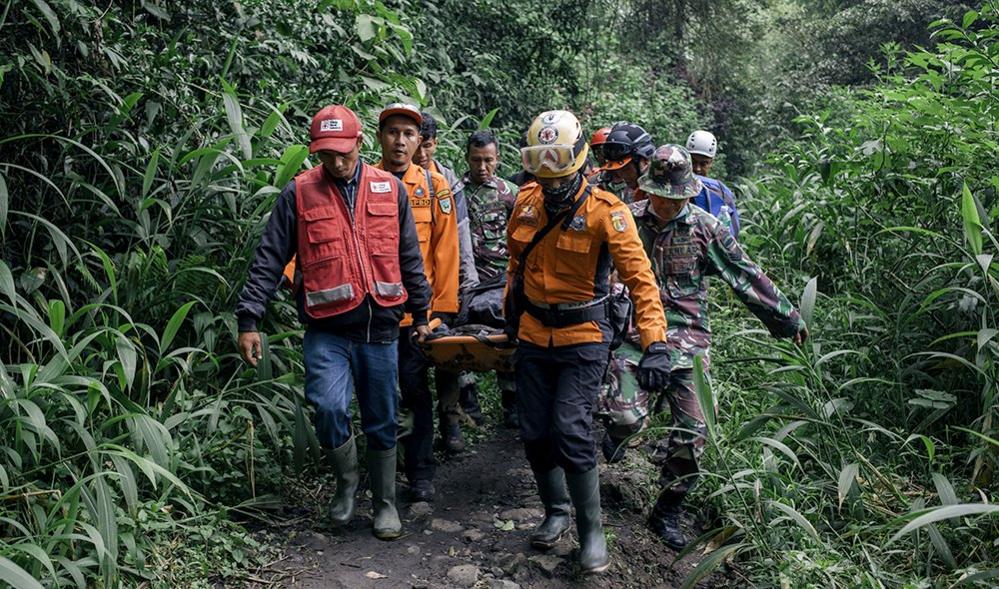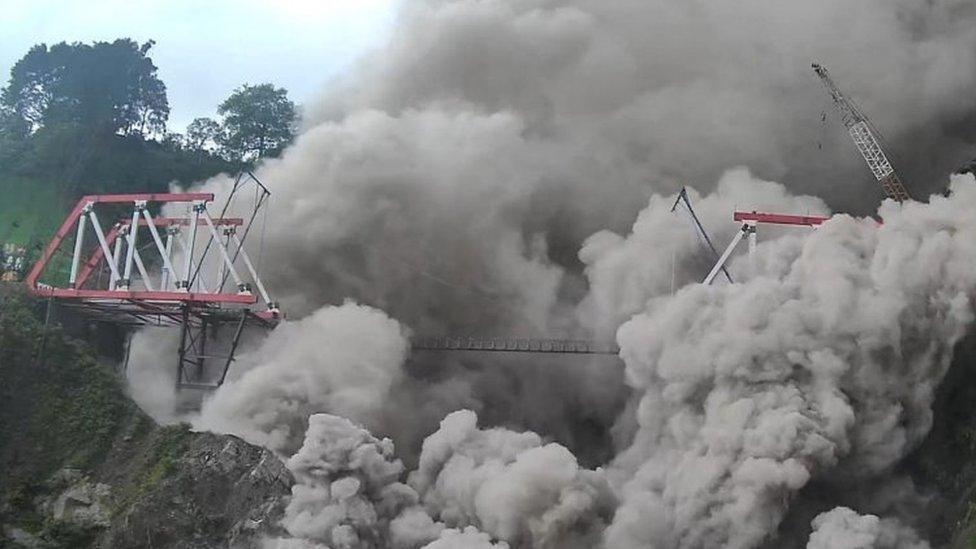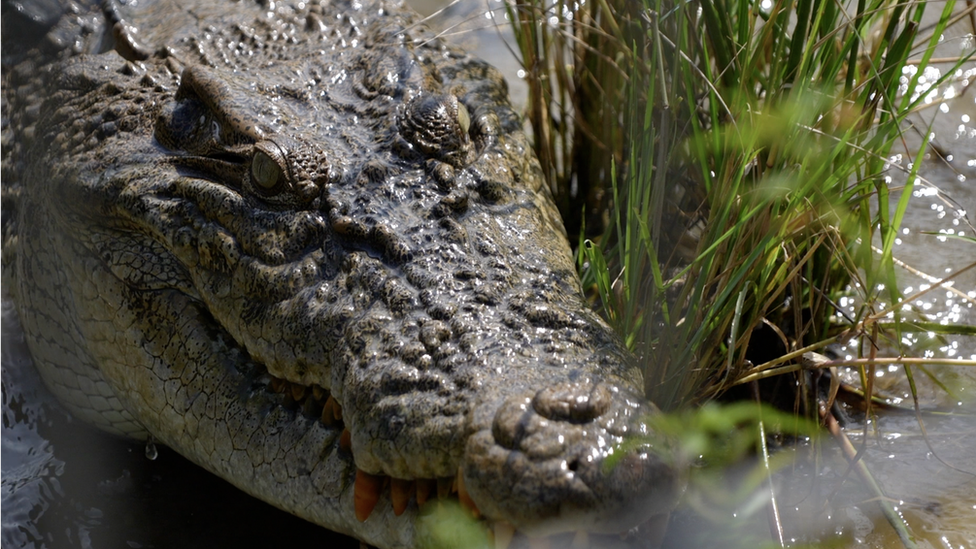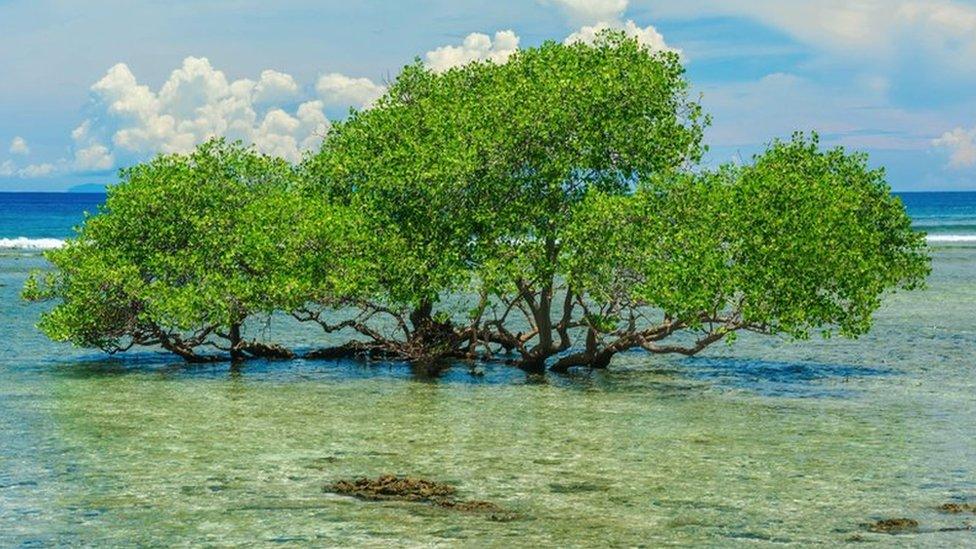Mount Marapi: Eleven hikers killed as volcano erupts in Indonesia
- Published
Watch: Ash-covered Indonesia volcano survivor sends video to mum asking for help
Eleven hikers have been found dead near the crater of Indonesia's Mount Marapi volcano after it erupted over the weekend, rescuers say.
Twelve others are missing and the search was suspended on Monday after another, smaller eruption.
There were 75 hikers in the area during the main eruption on Sunday but most were safely evacuated.
Marapi spewed a 3km (9,800ft) ash cloud into the air, dimming the sky and blanketing surrounding villages in ash.
It is among the most active of Indonesia's 127 volcanoes and is also popular among hikers. Some trails reopened only last June due to ash eruptions from January to February. Marapi's deadliest eruption occurred in 1979, when 60 people died.
Three people were rescued near the crater on Monday before the search was suspended. They were "weak and had some burns", said Abdul Malik, head of the Padang Search and Rescue Agency.
Forty-nine climbers were evacuated from the area earlier in the day, many of whom also suffered burns.
Authorities did not immediately release the identities of the hikers.
Video footage of Sunday's eruption showed a huge cloud of volcanic ash spread widely across the sky, and cars and roads covered with ash.
Rescue workers took turns carrying the dead and the injured down the mountain's arduous terrain and onto waiting ambulances with blaring sirens.
"Some suffered from burns because it was very hot, and they have been taken to the hospital," said Rudy Rinaldi, head of the West Sumatra Disaster Mitigation Agency.
Watch: Indonesia volcano spews ash 3km into sky

Sumatra's Marapi volcano - a dangerous climb
By Frank Gardner
Sumatra's "Gunung Marapi" volcano was deserted when we climbed it as teenage students in the 1980s. Foolishly, a university friend and I declined the offer of a guide from the village at the base of the slope and trekked up alone by a narrow path through the jungle.
The leeches soon found us, crawling into our socks and up our legs. We emerged at around 2,500m to find a world of blackened, twisted trees, scorched by a recent eruption. Clouds of sulphurous gases swirled around the crater and fissures opened up in the rock just metres away, revealing molten rock below.
Only then did we realise just how dangerous this volcano was - but by now it was getting dark, a freezing rain was falling and we couldn't locate the path back down through the jungle, leaving us thrashing through foliage for hours. We sorely regretted not bringing a guide.


Rescue workers coordinated to evacuate survivors from the area
One of the hikers, Zhafirah Zahrim Febrina, appealed to her mother for help in a video message from the volcano. The 19-year-old student, whose nickname is Ife, appeared shocked, her face burnt and her hair matted with thick grey ash.
"Mom, help Ife. This is Ife's situation right now," she said.
She was on a hiking trip in Marapi with 18 school friends and is now in hospital receiving treatment.
Her mother, Rani Radelani, told AFP news agency that her daughter underwent "tremendous trauma".
"She is affected psychologically because she saw her burns, and she also had to endure the pain all night," she said.
Another hiker moaned in pain and said "God is great" as a rescuer carried her on their back, the news agency reported.
Jodi Haryawan, a spokesperson for the local search and rescue team, told reporters that it would be "too dangerous" to continue searching while the volcano was erupting.
Marapi is located on Sumatra, the westernmost and third largest of Indonesia's 18,000 islands. It stands 2,891m (9,485ft) high.
The Indonesian archipelago sits on the so-called Pacific Ring of Fire, where the meeting of continental plates causes high volcanic and seismic activity.
Additional reporting by Hanna Samosir in Jakarta


Are you personally affected by this story? Share your experiences by emailing haveyoursay@bbc.co.uk, external.
Please include a contact number if you are willing to speak to a BBC journalist. You can also get in touch in the following ways:
WhatsApp: +44 7756 165803
Tweet: @BBC_HaveYourSay, external
Please read our terms & conditions and privacy policy
If you are reading this page and can't see the form you will need to visit the mobile version of the BBC website to submit your question or comment or you can email us at HaveYourSay@bbc.co.uk, external. Please include your name, age and location with any submission.
- Published4 December 2022

- Published21 October 2023

- Published14 August 2023
